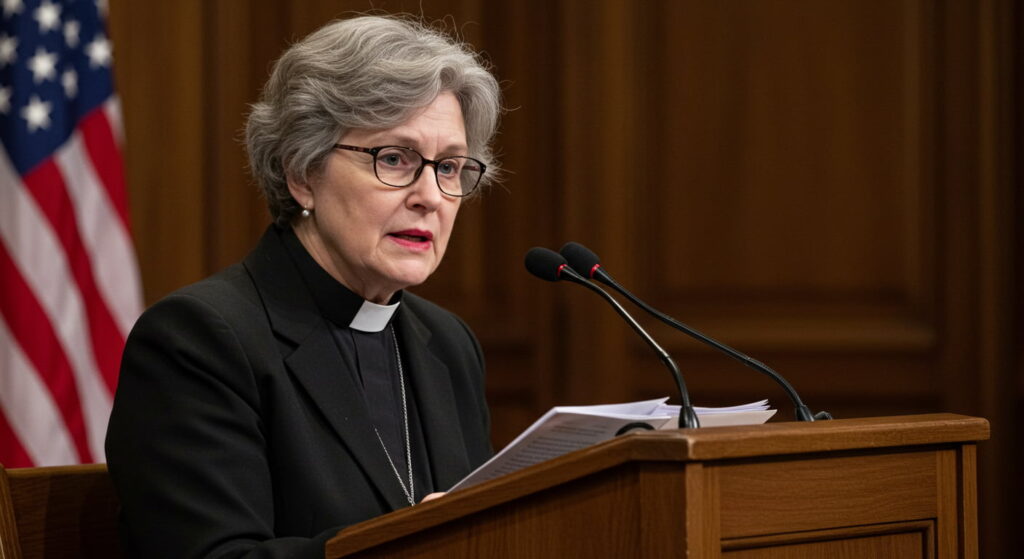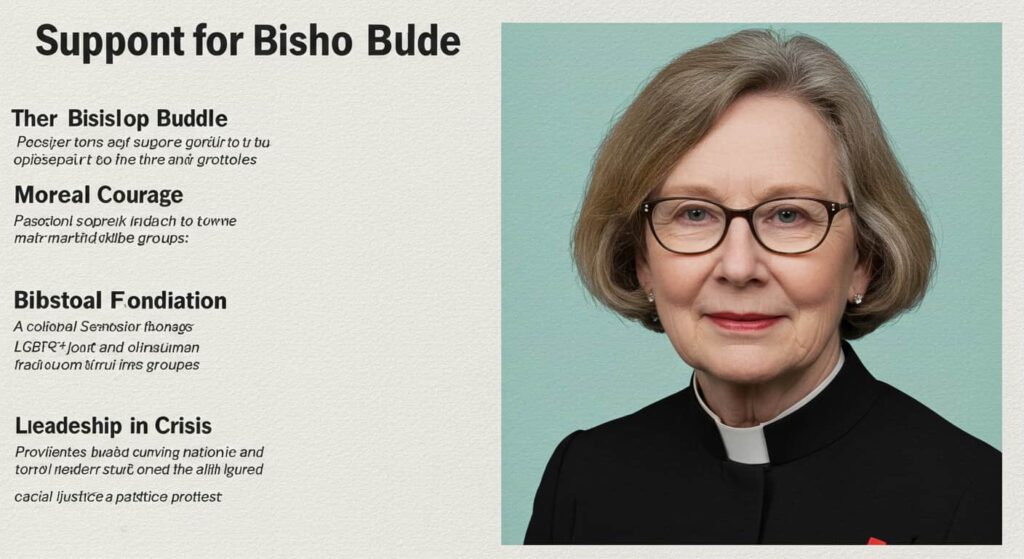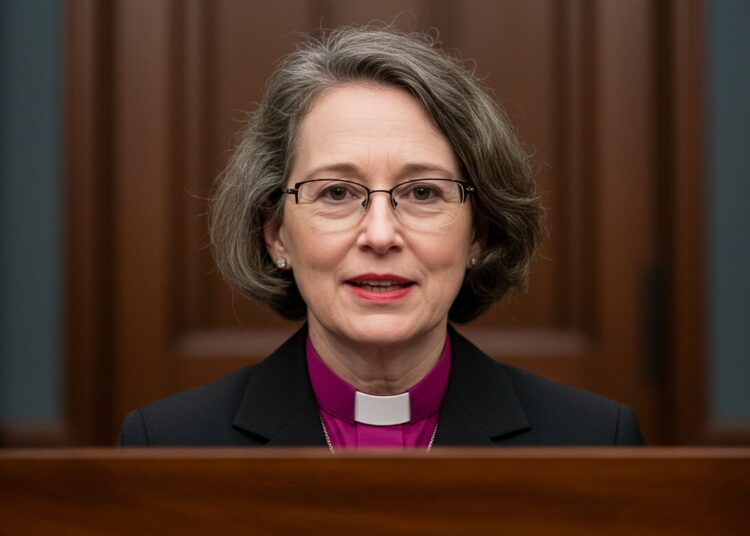In recent years, the intersection of faith, politics, and social justice has become one of the most polarizing conversations in the United States. At the center of this discussion stands Bishop Mariann Edgar Budde, leader of the Episcopal Diocese of Washington. She has been both praised and criticized for her outspoken views on social justice, inclusion, and what critics label as “wokeness.”
The phrase “Bishop Budde woke controversy” has been circulating online, fueled by debates about her role in public life, her criticism of political leaders, and her embrace of progressive values. To understand this fully, it’s important to explore who Bishop Budde is, what she stands for, and why her leadership has sparked such a strong reaction.
Who Is Bishop Mariann Edgar Budde?
Bishop Mariann Edgar Budde was elected the ninth bishop of the Episcopal Diocese of Washington in 2011. She oversees more than 80 congregations and schools across the District of Columbia and surrounding areas in Maryland.
Known for her calm demeanor and strong convictions, Budde has consistently emphasized themes such as:
- Racial justice and equality
- Inclusion of LGBTQ+ individuals in the church
- Climate responsibility and care for creation
- Engagement with political and civic leaders
Her style of leadership resonates with many progressives who see the church as a force for good in society. However, her critics argue that her positions align more with partisan politics than with traditional religious teaching, which has sparked the ongoing “woke” controversy.
The Origin of the “Woke” Debate

The term woke originally meant being awake to issues of racial and social injustice. Over time, however, it has taken on political connotations. Supporters see it as awareness and activism, while detractors use it as shorthand for what they view as excessive political correctness or cultural overreach.
When Bishop Budde speaks out on issues like racial inequality, immigration, or climate change, supporters view her as faithful to the Gospel’s call for justice. Critics, however, label her “woke”—sometimes dismissively—to suggest that she is prioritizing political ideology over spiritual guidance.
This clash has become a defining element of her public profile.
Bishop Budde and the Trump Bible Photo Controversy
One of the most high-profile moments that brought Bishop Budde into the national spotlight was in June 2020, during protests following the killing of George Floyd.
Then-President Donald Trump stood outside St. John’s Episcopal Church in Washington, D.C., holding up a Bible after protesters had been cleared from the area. The event sparked outrage from many faith leaders.
Bishop Budde, whose diocese oversees St. John’s, issued a strong statement condemning the act. She argued that the church had not been consulted and that the gesture politicized a sacred symbol.
Her response made headlines worldwide and cemented her image as a religious leader willing to challenge political power. Supporters applauded her courage; critics accused her of being divisive and aligning with progressive activism.
This single moment amplified the “Bishop Budde woke controversy” and remains one of the key reasons her name continues to appear in political and cultural debates.
Also read: Utmat
The Role of Faith in Social Justice
To understand why Bishop Budde takes the positions she does, it’s useful to look at the Episcopal Church’s broader tradition. Historically, the church has supported social justice movements, from the civil rights era to the present day.
Bishop Budde often frames her advocacy not as partisan politics, but as faith in action. She argues that Christianity requires:
- Speaking out against oppression
- Defending marginalized groups
- Promoting peace and reconciliation
Her supporters see this as authentic discipleship. Her critics, however, see it as evidence that the church has been overtaken by “woke” ideology.
This tension is not unique to Budde but reflects a broader struggle across many denominations as faith communities wrestle with their role in modern society.
Criticism of Bishop Budde
The controversy surrounding Bishop Budde is fueled by sharp criticism from various corners. Some of the main critiques include:
- Partisan Alignment – Critics argue she too often echoes progressive talking points.
- Neglect of Tradition – Some say her focus on modern social issues distracts from core Christian teachings.
- Public Confrontations – Moments like the Trump photo-op pushback are viewed by some as unnecessary political involvement.
- The “Woke” Label – For her opponents, the term symbolizes everything they dislike about her leadership style.
These criticisms are often amplified in online spaces, where the phrase “bishop budde woke controversy” trends in conversations mixing politics, religion, and culture wars.
Support for Bishop Budde
At the same time, Bishop Budde has strong support among many Episcopalians and faith leaders across the country. Her defenders highlight:

- Moral Courage – Willingness to speak truth to power
- Pastoral Sensitivity – Advocacy for LGBTQ+ inclusion and marginalized groups
- Biblical Foundation – A conviction that social justice is rooted in scripture
- Leadership in Crisis – Providing guidance during national turmoil, such as the pandemic and racial justice protests
For these reasons, many see her as a prophetic voice rather than a partisan one.
Why the Controversy Matters
The Bishop Budde woke controversy is not just about one church leader. It reflects deeper questions facing American society today:
- Should religious leaders speak out on political and social issues?
- Where is the line between faith and politics?
- How should churches respond to cultural shifts around race, gender, and equality?
By engaging in these questions, Bishop Budde has become a symbol of the larger struggle over the role of religion in public life.
Also read: Zosqk
SEO Insights: Why People Search “Bishop Budde Woke”
From a search engine optimization (SEO) perspective, the phrase “Bishop Budde woke” gains traction because it blends:
- A recognizable public figure (Bishop Budde)
- A hot-button culture word (woke)
- Controversy and media coverage
People searching this keyword are often looking for:
- Background on who Bishop Budde is
- Explanations of her political and religious positions
- Clarification of why she is called “woke”
- Reactions from both critics and supporters
By providing a balanced, well-researched article, websites can rank for this keyword while also offering readers meaningful context.
Conclusion:
The Bishop Budde woke controversy illustrates the deep intersection of faith, politics, and social justice in modern America. While critics accuse her of being overly political and “woke,” her supporters see her as a courageous leader committed to justice and compassion.
Whether one agrees or disagrees with her, there is no denying that Bishop Budde has become a significant voice in national conversations about religion and society. Her story forces us to reflect on the responsibilities of faith leaders in a divided world and challenges us to think critically about the role of the church in addressing pressing issues of our time.
FAQs About Bishop Budde and the Woke Controversy
1. Who is Bishop Mariann Edgar Budde?
She is the Episcopal Bishop of Washington, serving since 2011, and known for her advocacy on social justice issues.
2. Why is Bishop Budde called “woke”?
Critics use the term to suggest she aligns with progressive politics, especially on race, gender, and inclusion.
3. What was the Trump Bible photo controversy?
In June 2020, Trump posed with a Bible at St. John’s Church. Budde criticized the act as politicizing a sacred symbol.
4. Does Bishop Budde support LGBTQ+ inclusion?
Yes, she strongly supports LGBTQ+ rights and inclusion within the church.
5. Is the Episcopal Church generally progressive?
The Episcopal Church is often considered one of the more progressive Christian denominations in the U.S.
6. Why do some Christians disagree with Bishop Budde?
Some feel she prioritizes political activism over traditional spiritual teaching.
7. Has Bishop Budde written any books?
Yes, she has authored works on faith, leadership, and spirituality.
8. How does Bishop Budde view social justice?
She sees it as a biblical calling and a central part of Christian discipleship.
9. What impact did her criticism of Trump have?
It brought her national attention and made her a symbol of religious resistance to political power.
10. What does the Bishop Budde controversy reveal about religion in America?
It highlights the ongoing debate over how faith should engage with politics and cultural change.
Related post:
















